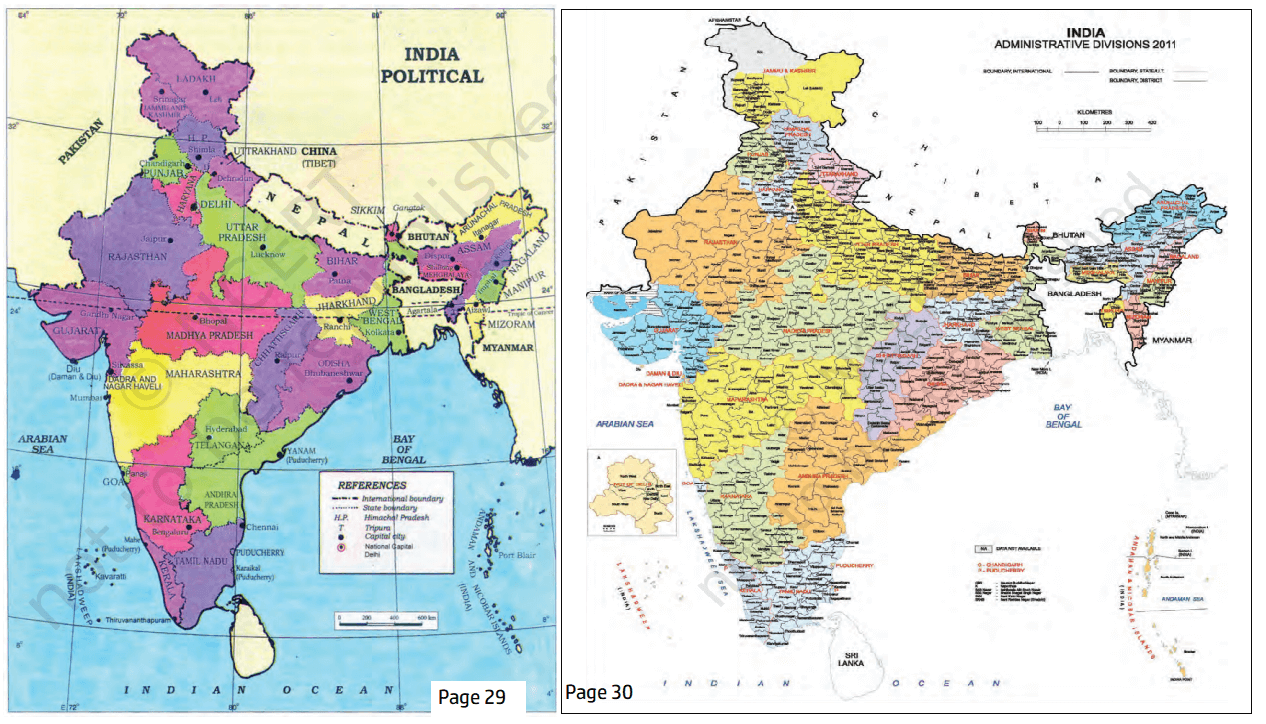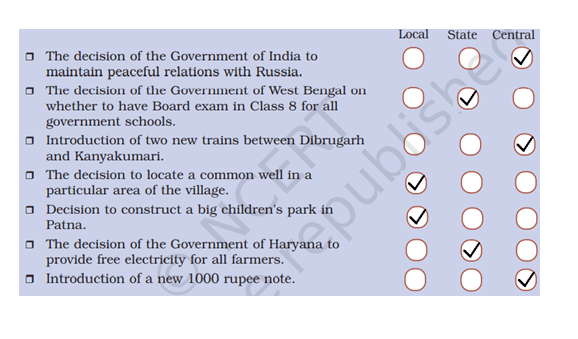Civics - Class 6
Our Past - I
Chapter 3: What is Government?
Intext Questions:
Question 1. What do governments do?
Answer:A government's basic functions are providing leadership, maintaining order, providing public services, providing national security, providing economic security, and providing economic assistance.
Question 2. How do they decide what to do?
Answer:Based on the type of government formed, people who are in the government decide what to do. In monarchies, King/ Monarch alone dictate what to do where as in democracies regular meetings are held among ministers. They take up decide what to do by analysing public demand, media reports, etc.,. that to by abiding constitution.
Question 3. What is the difference between different types of governments such as monarchies and democracies?
Answer:Democracy is a form of government in which the people have the authority to choose their governing legislation. A monarchy is a form of government in which a person, the monarch, is the head of state for life or until abdication.
Question 4. Look at the newspaper headlines above and list the different kinds of activities that the government is reported to be doing in these newspaper headlines .
Answer:The different kind of work that the government does (as given in the newspapers headlines) are:
- The government protects the rights of the people in the unorganized sector.
- The government fixes the prices of essential commodities.
- The government makes a plan to protect the people in case of natural calamities.
- The government provides food, (wheat and rice, etc.) where there is scarcity due to some reason.
- As the workload increases, the Supreme Court appoints more judges.
- The government will improve the condition in the coal and power sector.
Question 5. Isn’t this a wide range of activities?
Answer:Yes, the government has to tackle all kinds of problems in the country.
Question 6. What do you think the government is? Discuss in the class.
Answer:The government is a group of people who looks to provide all the needs of the society; it protects the people in case of natural calamities, protects the rights of the workers, and works for the welfare of the people.
Question 7. Can you list three things that the government does which have not been mentioned?
Answer:The government does the following things:
- Make laws for the whole country.
- Provide education.
- Minting of coins and printing of currency notes.
Discuss:
Question 1. Why do you think it is important that people abide by the law? Think of an example of another law.
Answer: It is a law that people should pay all taxes income tax, VAT, house tax, water, and electricity bill before the due date. If people do not abide by this law, the government can find them how is the government going to function, if we do not pay taxes. We have consumed water and electricity, so it is our responsibility to make payments on time.
Question 2. Do you think it is important for people to be involved in decisions that affect them? Give two reasons for your answers.
Answer:People should be involved in decision making because,
- They know about their needs and problems and
- They are in a better position to decide how to solve these problems.
Question 3. Which type of government would you prefer to have in the place you live in. Why?
Answer:We would prefer to have a democratic form of government in India. India is a very big country with a huge population. Everyone can participate in the affairs of the government, through elections. It gives a sense of justice and equality to the people.
Question 4. Which of the statements below is correct? Correct those sentences that you think need correction.
- In a monarchy the country’s citizens are allowed to elect whomever they want.
Answer: Incorrect. Monarchy is a rule by a single person, who has inherited the throne after his father.
- In a democracy a king has absolute powers to rule the country.
Answer: Incorrect. In a democracy, the government is elected by the people. On the other hand, the king has come to power through inheritance and enjoys absolute powers.
- In a monarchy, people can raise questions about the decisions the monarch takes.
Answer:Incorrect. In a monarchy, the king enjoys absolute powers and no one can question his authority and decisions.
Maps:
Question: Look at the maps on Pages 29 and 30. They show the States, Union Territories and Districts of India. Find out the following information from these maps and various other resources.

-
I Names of the neighbours of India.
Answer:
- Pakistan
- China
- Nepal
- Bhutan
- Bangladesh
- Myanmar
- Afghanistan
- I Names of your State or Union Territory and its neighbours.
Answer:My State is Andhra Pradesh and Its neighbours are:
- Telangana
- Chattisgarh
- Odisha
- Karnataka
- Tamilnadu
- I Names of your District and its neighbours.
Answer:My district name is East Godavari and its neighbours are:
- Visakhapatnam
- West Godavari
- Khammam
- Odisha
- I Routes from your District to the National Capital.
Answer:
- East Godavari – Odisha- Chattisgarh- Maharastra- Madhya Pradesh-Uttarpradesh- Delhi
- East Godavari- Odisha- Chattisgarh- Maharastra- Madhya Pradesh- Rajasthan- Uttarpradesh- Haryana- Delhi
Exercise:
Question: Look at the statements in the column on the left. Can you identify which level they belong to? Place tick marks against the level you consider most appropriate,
Answer:

Questions:
Question 1. What do you understand by the word ‘government’? List five ways in which you think the government affects your daily life.
Answer:The word government refers to a governing body that makes decisions and gets things done for the welfare of its citizens.
- The government provides legal supports to its citizens against any discrimination and injustice.
- It maintains peace and so keeps society in order.
- It controls crime.
- It assists people to lead a proper life.
- In the event of natural calamities, the government provides all emergency assistance to the affected people.
Question 2. Why do you think the government needs to make rules for everyone in the form of laws?
Answer:It is necessary for the government to make rules for everyone in the form of laws because
- When human beings live and work together, some kind of organization and decisions has to be made.
- Some rules have to be made in order to control the resources and protect the territory of a country, so people can be safe and secure.
Question 3. Name two essential features of a democratic government.
Answer:Essential features of a democratic government:
- It is the government of the people, by the people, and for the people.
- People make decisions and make laws through their elected representatives.
Question 4. What was the suffrage movement? What did it accomplish?
Answer:The word suffrage means the right to vote. The women and the poor people in Europe and the USA had to fight to get the right to vote. It was not an easy struggle. The demand for the right to vote got strengthened during the First World War. American women got the right to vote in 1920. In the U.K. the women got the right to vote in 1928, on the same terms as men.
Question 5. Gandhiji strongly believed that every adult in India should be given the right to vote. However, a lot of people don’t share his views. Many feel that illiterate people, who are mainly poor, should not be given the right to vote. What do you think? Do you think this would be a form of discrimination? Give five points to support your view and share these with the class.
Answer:All citizens are equal. The constitution aims at providing all equality to all its citizens.
- We have no right to discriminate against anyone on the basis of poverty.
- An illiterate is also a citizen of India. He should not be debarred from voting right on the basis of his illiteracy.
- Our constitution provides equal voting rights to all its citizens.
- As ideal citizens, we all have to abide by the constitutional provisions.
- We must honour human dignity and legal provisions.